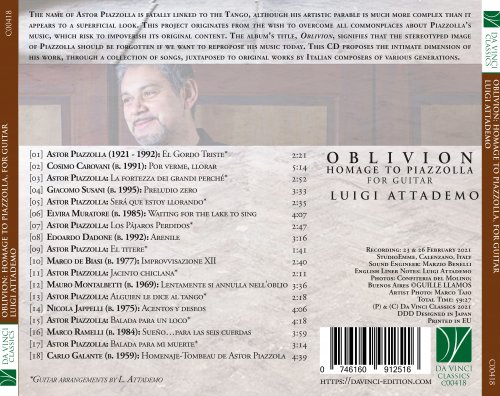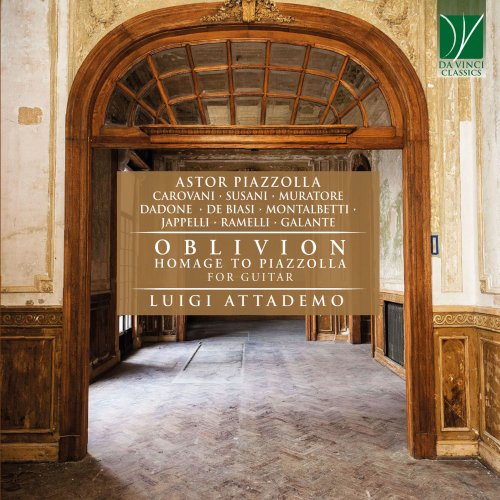
Luigi Attademo - Oblivion: Homage to Piazzolla (2021)
BAND/ARTIST: Luigi Attademo
- Title: Oblivion: Homage to Piazzolla
- Year Of Release: 2021
- Label: Da Vinci Classics
- Genre: Classical Guitar
- Quality: flac lossless
- Total Time: 00:59:27
- Total Size: 195 mb
- WebSite: Album Preview
Tracklist
01. El Gordo Triste (For Guitar)
02. Por verme, llorar (For Guitar)
03. La fortezza dei grandi perché (For Guitar)
04. Preludio zero (For Guitar)
05. Será que estoy llorando (For Guitar)
06. Waiting for the lake to sing (For Guitar)
07. Los Pájaros Perdidos (For Guitar)
08. Arenile (For Guitar)
09. El titere (For Guitar)
10. Improvvisazione XII (For Guitar)
11. Jacinto chiclana (For Guitar)
12. Lentamente si annulla nell'oblio (For Guitar)
13. Alguien le dice al tango (For Guitar)
14. Acentos y deseos (For Guitar)
15. Balada para un loco (For Guitar)
16. Sueño...para las seis cuerdas (For Guitar)
17. Balada para mi muerte (For Guitar)
18. Homenaje-Tombeau de Astor Piazzola (For Guitar)

The name of Astor Piazzolla is fatally linked to the Tango, although his artistic parable is much more complex than it appears to a superficial look. Many encounters influenced his musical life. Thanks to the great pianist Arthur Rubinstein, he became a pupil of Alberto Ginastera, whom Piazzolla kept acknowledging as the greatest Argentinian composer of his century. After this educational experience and that in the orchestra of Annibal Troilo, Piazzolla encountered European music through Nadia Boulanger with whom he studied. He then began an experimentation of his own, becoming – as he said in the Sixties – a vanguardista of the tango.
In those years he met Jorge Luis Borges, with whom he collaborated for the album El tango. Here we find the Canciones porteñas (three of which are recorded here), whose lyrics evoke the tanguera mythology. These two artists cooperated in order to recover the language and music of traditional tango, beyond all stereotypes. In an interview, Borges himself stated: “yo lo estoy rescatando para una música nueva”.
The relationship between Borges and Piazzolla was limited to this cooperation, and it ended due to the differences and distance among them. However, it represented for Piazzolla a great possibility to experiment and to work on his lifelong project of renewal of Argentinian music.
Horacio Ferrer, another great Uruguayan poet and a historian who authored a fundamental Book of the Tango, immediately recognized Piazzolla’s unprecedented artistic stance and innovative power. This led to another cooperation, crucial for Piazzolla’s poetics: it included Maria de Buenos Aires and many songs, comprising the five found in this album.
Piazzolla’s music is founded on the ground of the Rioplatense musical tradition, but it aims at a synthesis between folk music and experimental elements, begetting an immediate language capable of refreshing the tango’s idiom, also employing his classical education and his knowledge of jazz music.
As stated by Piazzolla, presenting Octeto Buenos Aires, his goal “es renovar el tango popular, mantener su esencia, introducir nuevos ritmos, nuevas armonías, melodías, timbres y formas y, sobre todo, no pretendemos hacer música llamada culta”. It is not a contamination, but rather a language transformation projected into the future. His avant-gardist goal to destructure all traditional models translates into a simple and immediately recognizable music. This connects him immediately to the audience, differently from what happened to other modernist composers.
Our project originates from the wish to overcome all commonplaces about Piazzolla’s music, which risk to impoverish its original content. We propose the intimate dimension of Piazzolla’s work, through a collection of his songs, juxtaposed to original works by Italian composers of various generations. Piazzolla’s style is thus related with the multiplicity of today’s languages, abandoning the tango clichés and entering into a fruitful dialogue with contemporaneity.
The album’s title, Oblivion, signifies that the stereotyped image of Piazzolla should be forgotten if we want to repropose his music today. We find his view mirrored by other composers, whose individual languages enter a dialogue with him.
01. El Gordo Triste (For Guitar)
02. Por verme, llorar (For Guitar)
03. La fortezza dei grandi perché (For Guitar)
04. Preludio zero (For Guitar)
05. Será que estoy llorando (For Guitar)
06. Waiting for the lake to sing (For Guitar)
07. Los Pájaros Perdidos (For Guitar)
08. Arenile (For Guitar)
09. El titere (For Guitar)
10. Improvvisazione XII (For Guitar)
11. Jacinto chiclana (For Guitar)
12. Lentamente si annulla nell'oblio (For Guitar)
13. Alguien le dice al tango (For Guitar)
14. Acentos y deseos (For Guitar)
15. Balada para un loco (For Guitar)
16. Sueño...para las seis cuerdas (For Guitar)
17. Balada para mi muerte (For Guitar)
18. Homenaje-Tombeau de Astor Piazzola (For Guitar)

The name of Astor Piazzolla is fatally linked to the Tango, although his artistic parable is much more complex than it appears to a superficial look. Many encounters influenced his musical life. Thanks to the great pianist Arthur Rubinstein, he became a pupil of Alberto Ginastera, whom Piazzolla kept acknowledging as the greatest Argentinian composer of his century. After this educational experience and that in the orchestra of Annibal Troilo, Piazzolla encountered European music through Nadia Boulanger with whom he studied. He then began an experimentation of his own, becoming – as he said in the Sixties – a vanguardista of the tango.
In those years he met Jorge Luis Borges, with whom he collaborated for the album El tango. Here we find the Canciones porteñas (three of which are recorded here), whose lyrics evoke the tanguera mythology. These two artists cooperated in order to recover the language and music of traditional tango, beyond all stereotypes. In an interview, Borges himself stated: “yo lo estoy rescatando para una música nueva”.
The relationship between Borges and Piazzolla was limited to this cooperation, and it ended due to the differences and distance among them. However, it represented for Piazzolla a great possibility to experiment and to work on his lifelong project of renewal of Argentinian music.
Horacio Ferrer, another great Uruguayan poet and a historian who authored a fundamental Book of the Tango, immediately recognized Piazzolla’s unprecedented artistic stance and innovative power. This led to another cooperation, crucial for Piazzolla’s poetics: it included Maria de Buenos Aires and many songs, comprising the five found in this album.
Piazzolla’s music is founded on the ground of the Rioplatense musical tradition, but it aims at a synthesis between folk music and experimental elements, begetting an immediate language capable of refreshing the tango’s idiom, also employing his classical education and his knowledge of jazz music.
As stated by Piazzolla, presenting Octeto Buenos Aires, his goal “es renovar el tango popular, mantener su esencia, introducir nuevos ritmos, nuevas armonías, melodías, timbres y formas y, sobre todo, no pretendemos hacer música llamada culta”. It is not a contamination, but rather a language transformation projected into the future. His avant-gardist goal to destructure all traditional models translates into a simple and immediately recognizable music. This connects him immediately to the audience, differently from what happened to other modernist composers.
Our project originates from the wish to overcome all commonplaces about Piazzolla’s music, which risk to impoverish its original content. We propose the intimate dimension of Piazzolla’s work, through a collection of his songs, juxtaposed to original works by Italian composers of various generations. Piazzolla’s style is thus related with the multiplicity of today’s languages, abandoning the tango clichés and entering into a fruitful dialogue with contemporaneity.
The album’s title, Oblivion, signifies that the stereotyped image of Piazzolla should be forgotten if we want to repropose his music today. We find his view mirrored by other composers, whose individual languages enter a dialogue with him.
Year 2021 | Classical | FLAC / APE
As a ISRA.CLOUD's PREMIUM member you will have the following benefits:
- Unlimited high speed downloads
- Download directly without waiting time
- Unlimited parallel downloads
- Support for download accelerators
- No advertising
- Resume broken downloads


